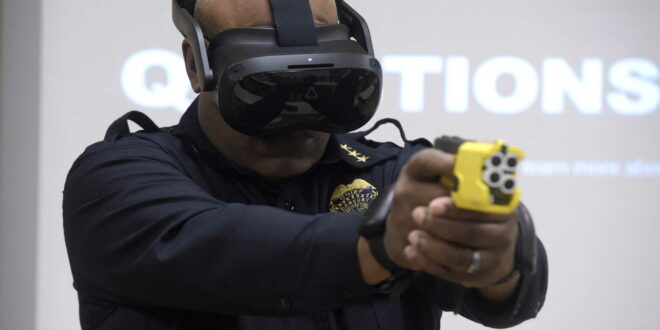DANBURY Virtual reality is not part of a Danbury police officer’s training, but it may be.
Technology and weapons development company Axon Network showed staff at Danbury Police Headquarters Thursday how virtual reality and simulation technology can better prepare officers for complex situations that require critical thinking and de-escalation.
“It’s really, really realistic,” said Mayor Dean Esposito after trying out one of the Axon training modules.
After donning the VR goggles, Esposito was twice immersed in a scenario involving a man with schizophrenia—first from the man’s point of view, then from that of an off-duty police officer who interviews him.
Virtual reality is one of the latest products that Axon is working on to improve policing, along with officer and community safety. The company began in 1993 making stun guns as Taser International, then moved into body cameras in the mid-2000s.
Axon’s senior regional director Mark Swenson said police departments don’t get enough training, but virtual reality equipment and simulation technology can help “bridge the gap between officers and what they don’t get.”
Danbury police officers are equipped with Axon body cameras, but the department hasn’t purchased the company’s virtual reality and simulation technology — not yet, at least.
“If it fits the budget,” Prime Minister Patrick Ridenhauer said, adding that the integration of virtual reality could improve officer training.
Clint Collins, Axon Solutions Specialist and former law enforcement official, agreed that adding virtual reality and simulation technology training could produce better results rather than relying on traditional training methods such as classroom instruction and role-playing.
Traditional methods are time-consuming, limited, expensive, and unrealistic, Collins said, but those trained using VR tend to retain information better than those who don’t.
“Virtual reality is the answer to effective police training,” he said, adding that retention rates among VR users are around 80 percent.
Collins said that immersion in VR makes a difference because it “creates a memory”.
In addition to enhancing situational learning objectives and de-escalation tactics, VR can help officers hone shooting range skills and practice de-escalation techniques.
The goal of simulation training is to prepare officers to make informed split-second decisions, Collins said, adding that “thinking proactively rather than reacting” can prevent escalation.
Simulation modules, like the one Esposito tried on Thursday, give officers the opportunity to practice responding to different types of calls — from those involving mentally ill or cognitively impaired individuals to officer crisis situations and domestic violence situations.
Peter Elst, Danbury Police Officer and Crisis Intervention Team Coordinator, said having virtual reality technology can help officers and the community.
“As a CIT team, we respond to crisis situations every day – from people with depression, mania and homelessness – to things that aren’t in our wheelhouse,” he said.
Esposito said he would prefer to invest in virtual reality training equipment and technology for the Danbury Police Force.
“The goal is for you to get the best training possible. It keeps you and the community safe,” he said. “I support that 100 percent.”
Originally posted 2022-11-18 09:47:27.
